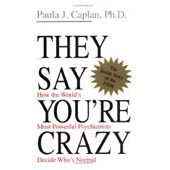Psych Diagnosis Bias: Paula Caplan
First Aired: 04-30-2008 -- 1 comment | Add comment

Harvard University faculty Paula Caplan, author of They Say You’re Crazy: How The World’s Most Powerful Psychiatrists Decide Who’s Normal and editor of Bias In Psychiatric Diagnosis.
Paula was on one of the writing committees for the DSM and offers an insightful perspective on the politics behind psychiatric pseudo-science. She discusses mental disorder labeling, including bipolar and post-trauma stress disorder, from a feminist perspective.
http://www.psychdiagnosis.net
http://paulajcaplan.net
Podcast: Play in new window | Download (Duration: 56:31 — 51.8MB)
Subscribe: RSS



























 Creative Commons 2.5 copyright
Creative Commons 2.5 copyright
I recently got this email from Paula further addressing the question of how to help people without diagnosing or labeling them:
(1) In the book Bias in Psychiatric Diagnosis, there is a chapter near the very end that is written under a pseudonym by a woman who works as a psychologist at a community mental health center in Canada. She describes how, under her province’s single-payer plan, when she and colleagues just stopped giving psych diagnoses to their clients, nothing happened. Enough to make anyone feel Canada envy!
(2) For many years after I started working on all this, people would ask me what was the solution, since no one wants insurance to stop covering sessions if people want them. (As you know, I think far too many people see therapists who are not helpful and could benefit more by a host of other
things, such as jobs, good housing, and other things as I describe in my chapter on Emotional Health in the current edition of Our Bodies, Ourselves.) For a long time I would reply that I didn’t know what the answer was but just knew that lots of people are harmed by psych dx, and it is not scientific, and I think that the first important steps are to expose the harm and the unscientific nature, educate the public and professionals about
Then, when I was editing Bias in Psychiatric Diagnosis, I was reading Meadow Linder’s chapter for that book, and it is about how really fine therapists (I know they are, because I sent her to some of them myself) use the DSM labels in a very approximate way. And it hit me: You know that insurance companies are well aware that therapists play fast and loose with diagnostic labels, that is, they do not make sure that a person meets all the DSM criteria before assigning a particular label; the good ones are just trying to find the least serious-sounding label (to avoid negative fallout from having a label) while still trying to use a label that will get insurance coverage for however many sessions the therapist thinks the client needs.
So the big ah-ha moment I had was to realize that what we should do is the revolutionary thing of EVERYBODY BEING HONEST! That is, instead of pretending that psych dx is a science and that the particular label tells you something important about how many sessions (and of what kind) will be needed, therapists who qualify by state law and/or insurance regulations to
get reimbursed by insurance should just be told: “Decide how many sessions this person needs, let us know, and we will cover them…at least up to a point.”